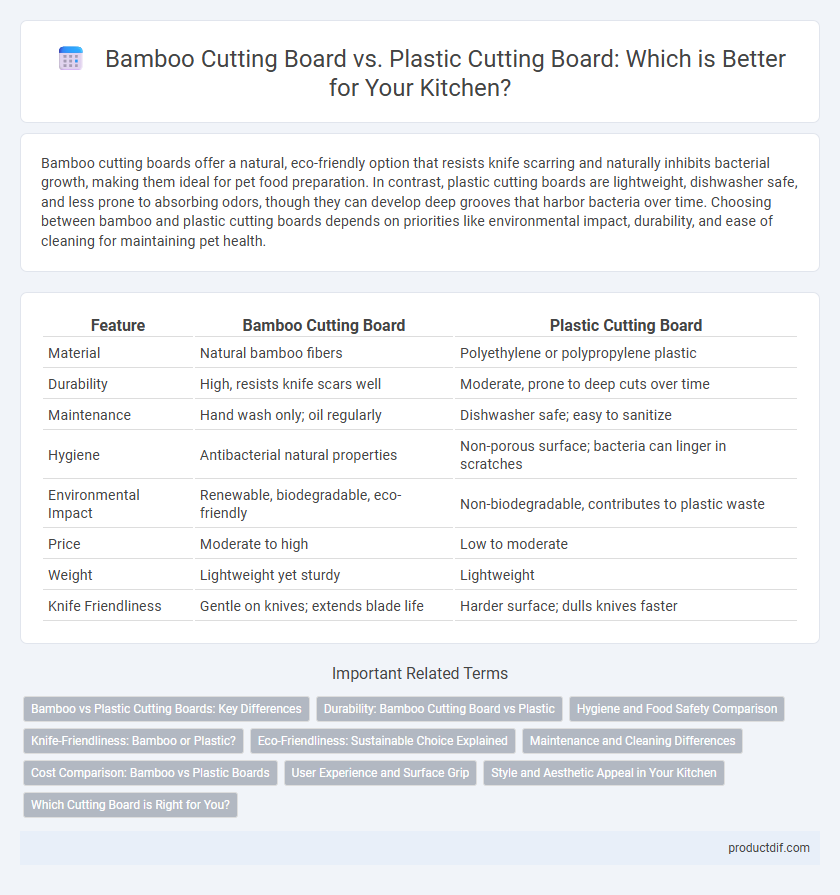Bamboo cutting boards offer a natural, eco-friendly option that resists knife scarring and naturally inhibits bacterial growth, making them ideal for pet food preparation. In contrast, plastic cutting boards are lightweight, dishwasher safe, and less prone to absorbing odors, though they can develop deep grooves that harbor bacteria over time. Choosing between bamboo and plastic cutting boards depends on priorities like environmental impact, durability, and ease of cleaning for maintaining pet health.
Table of Comparison
| Feature | Bamboo Cutting Board | Plastic Cutting Board |
|---|---|---|
| Material | Natural bamboo fibers | Polyethylene or polypropylene plastic |
| Durability | High, resists knife scars well | Moderate, prone to deep cuts over time |
| Maintenance | Hand wash only; oil regularly | Dishwasher safe; easy to sanitize |
| Hygiene | Antibacterial natural properties | Non-porous surface; bacteria can linger in scratches |
| Environmental Impact | Renewable, biodegradable, eco-friendly | Non-biodegradable, contributes to plastic waste |
| Price | Moderate to high | Low to moderate |
| Weight | Lightweight yet sturdy | Lightweight |
| Knife Friendliness | Gentle on knives; extends blade life | Harder surface; dulls knives faster |
Bamboo vs Plastic Cutting Boards: Key Differences
Bamboo cutting boards are made from fast-growing, sustainable grass fibers, offering a harder, more durable surface that resists knife scars and is naturally antimicrobial, unlike plastic cutting boards which are prone to deep cuts that harbor bacteria. Plastic boards, often made from polyethylene or polypropylene, are lightweight, dishwasher safe, and more affordable but tend to wear out faster and may release toxins when heated or scratched. Bamboo boards require hand washing and maintenance but provide a more eco-friendly option with better longevity and aesthetic appeal compared to plastic alternatives.
Durability: Bamboo Cutting Board vs Plastic
Bamboo cutting boards offer superior durability due to their dense fiber structure, resisting knife grooves and warping better than plastic counterparts. Plastic cutting boards tend to develop deep cuts over time, which can harbor bacteria and reduce their lifespan. Bamboo's natural hardness and water resistance contribute to longer-lasting performance in kitchen use compared to standard plastic options.
Hygiene and Food Safety Comparison
Bamboo cutting boards naturally resist bacteria due to their dense fiber structure, making them a hygienic choice for food preparation. In contrast, plastic cutting boards can develop deep grooves from knife cuts, which may harbor harmful bacteria unless sanitized thoroughly. Regular cleaning with hot, soapy water or dishwasher use ensures plastic boards maintain food safety, while bamboo boards benefit from oiling to prevent cracking and bacterial growth.
Knife-Friendliness: Bamboo or Plastic?
Bamboo cutting boards are renowned for their knife-friendliness due to their slightly softer surface, which helps maintain sharp edges longer compared to plastic boards. Plastic cutting boards, while durable and easy to clean, tend to cause quicker knife dulling because of their harder, less forgiving texture. Choosing bamboo can extend the lifespan of your kitchen knives by minimizing blade wear during regular use.
Eco-Friendliness: Sustainable Choice Explained
Bamboo cutting boards offer superior eco-friendliness due to bamboo's rapid growth rate and renewable nature, making them a sustainable alternative to plastic boards, which are derived from non-renewable petroleum products. Bamboo is biodegradable and requires minimal chemical processing, reducing environmental impact compared to plastic, which often contributes to landfill waste and microplastic pollution. Choosing bamboo versus plastic cutting boards supports sustainable kitchenware practices by minimizing carbon footprint and promoting resource conservation.
Maintenance and Cleaning Differences
Bamboo cutting boards require gentle hand washing with mild soap and quick drying to prevent warping and cracking, while plastic cutting boards are dishwasher-safe, offering easier and more thorough sanitation. Bamboo's natural antimicrobial properties reduce bacterial growth but demand regular oiling to maintain surface integrity. Plastic boards, though more resistant to staining, can develop deep knife grooves harboring bacteria, necessitating frequent inspection and replacement.
Cost Comparison: Bamboo vs Plastic Boards
Bamboo cutting boards generally cost between $15 and $40, offering a durable and eco-friendly option that often surpasses plastic boards in longevity. Plastic cutting boards are typically more affordable, ranging from $5 to $20, but may require more frequent replacement due to knife marks and potential bacterial buildup. While initial costs favor plastic, bamboo boards provide better long-term value through increased durability and natural resistance to bacteria.
User Experience and Surface Grip
Bamboo cutting boards offer a natural, textured surface that enhances knife grip and reduces slipping, providing a safer and more controlled cutting experience. Plastic cutting boards typically feature a smoother surface, which can become slippery when wet, potentially compromising user stability during food preparation. Users often prefer bamboo for its sturdy feel and superior surface grip, leading to increased confidence and precision while chopping.
Style and Aesthetic Appeal in Your Kitchen
Bamboo cutting boards offer a warm, natural aesthetic that enhances kitchen decor with their rich textures and organic patterns, making them a stylish choice for those seeking an eco-friendly look. Plastic cutting boards provide a sleek, minimalist appearance available in various colors, allowing for easy coordination with modern or contemporary kitchen styles. The choice between bamboo and plastic cutting boards significantly influences the overall visual harmony and design coherence of your kitchen space.
Which Cutting Board is Right for You?
Bamboo cutting boards offer durability, natural antimicrobial properties, and eco-friendliness, making them ideal for those prioritizing sustainability and knife preservation. Plastic cutting boards provide lightweight convenience, are dishwasher-safe, and better resist deep grooves that can harbor bacteria, suiting users who prefer easy maintenance and frequent sanitizing. Choosing the right cutting board depends on balancing hygiene needs, environmental impact, and care preferences for your kitchen tasks.
Bamboo Cutting Board vs Plastic Cutting Board Infographic

 productdif.com
productdif.com